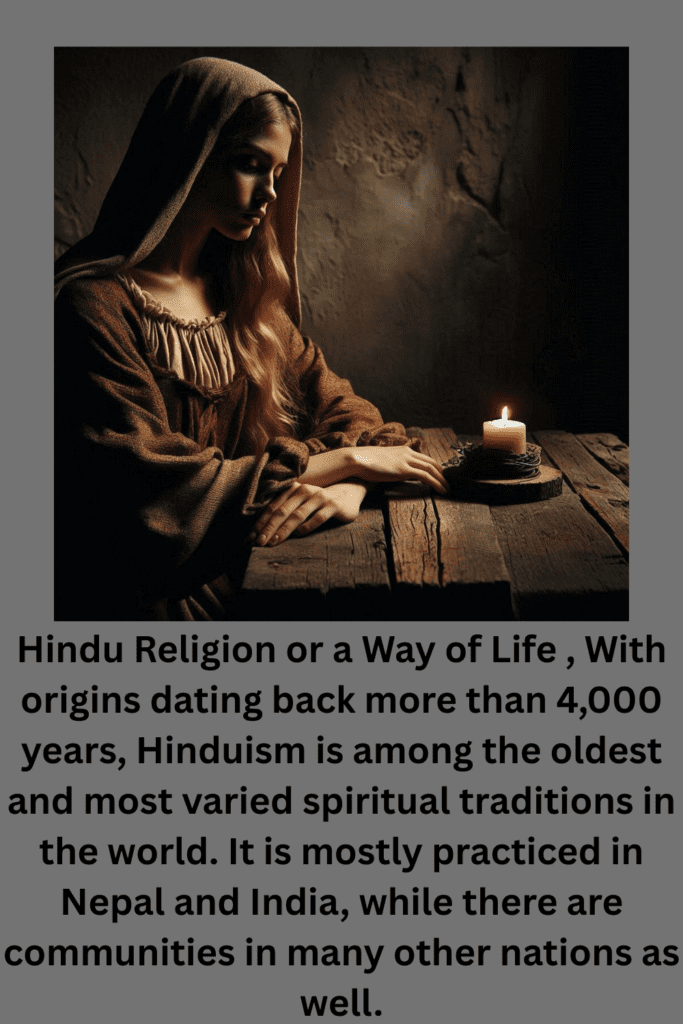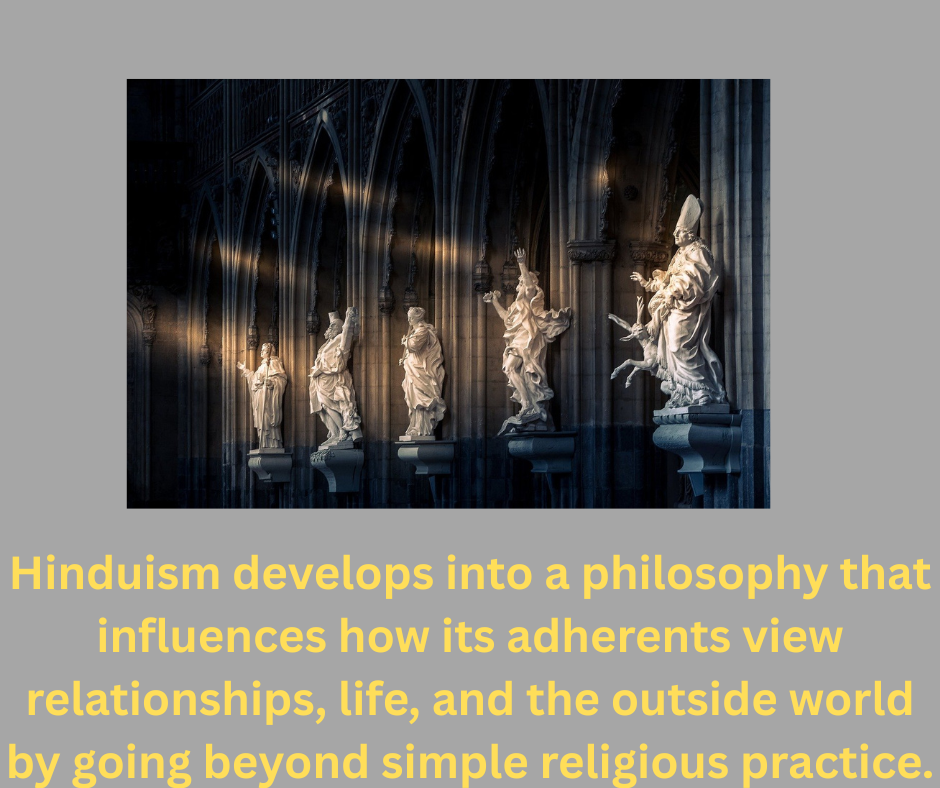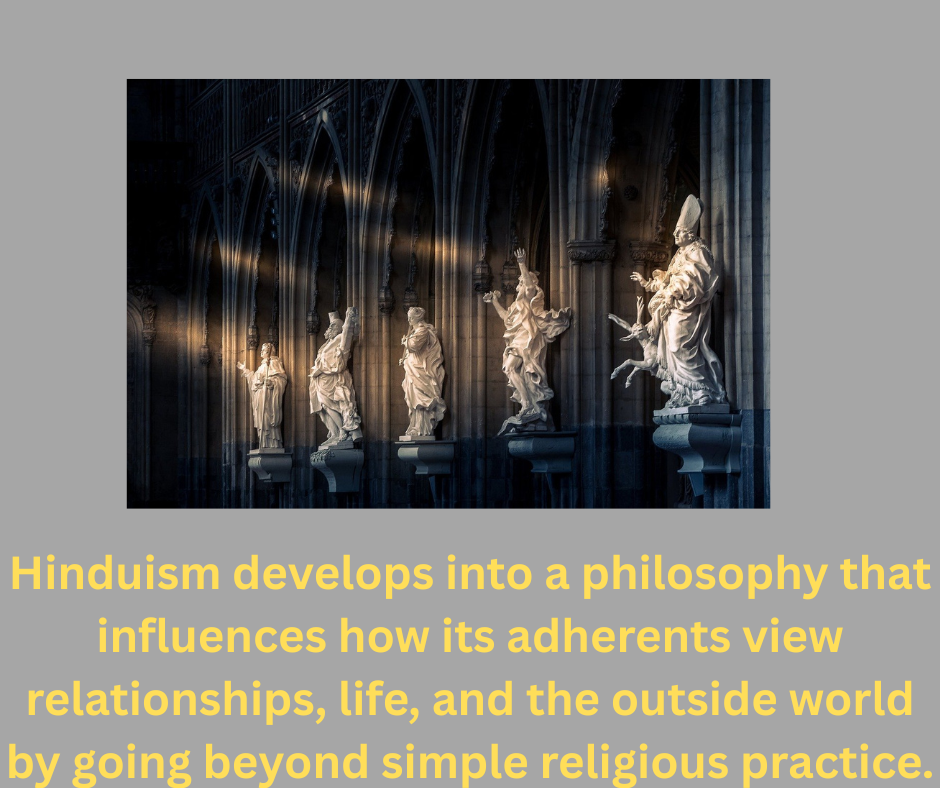Hindu Religion or a Way of Life , With origins dating back more than 4,000 years, Hinduism is among the oldest and most varied spiritual traditions in the world. It is mostly practiced in Nepal and India, while there are communities in many other nations as well. But describing Hinduism is more complicated than just calling it a “religion” or “way of life,” since the term itself refers to a broad range of cultural traditions, beliefs, practices, and philosophies.

Depending on one’s perspective on religion, spirituality, and the connection between belief and practice, the topic of whether Hinduism is a religion or a way of life is complicated.
Table of Contents
Both the idea that Hinduism is a religion and the idea that it is a way of life will be discussed in this article. This will demonstrate how Hinduism combines spiritual teachings with cultural customs and beliefs in a way that is distinctive, making it a deeply personal religion and a part of millions of people’s cultural identities.
Hinduism as a Religion
Hinduism does, in fact, fit many of the definitions of religion that academics generally use when discussing “religions.” It provides a collection of spiritual views on the nature of morality, the afterlife, human life, and deity. Hinduism shares many characteristics with other world faiths, including sacred texts, worship sites, rituals, and a wide variety of deities.
The Vedas, Upanishads, Bhagavad Gita, and Ramayana are the most well-known books in Hinduism. These writings offer direction on morality, spirituality, and the meaning of life. In Hinduism, the Vedas—which contain hymns, rites, and philosophical discussions—are regarded as the most authoritative texts.
Part of the epic Mahabharata, the Bhagavad Gita is one of the most well-known books and is studied extensively by both Hindus and non-Hindus for its lessons on the nature of God, responsibility (dharma), and devotion (bhakti).
Hinduism is also known for its polytheism, which acknowledges a large number of gods and goddesses, each of whom represents a distinct facet of the divine. In Hinduism, the three most significant gods are Shiva, the destroyer; Vishnu, the preserver; and Brahma, the creator. Hindu Religion or a Way of Life ,In temples and households throughout India and beyond, these and other deities serve as the foundation for worship.
Hindu Religion or a Way of Life,Hindu temples are frequently devoted to certain gods and act as the hubs of pilgrimages, festivals, and group worship.
The ideas of the atman (soul) and moksha (freedom) are also central to Hinduism as a religion. Hindus hold that freedom from the cycle of birth, death, and rebirth—known as samsara—is the ultimate aim of human existence.
There are other ways to achieve this freedom, such as through virtuous deeds (karma), dedication (bhakti), and wisdom (jnana). Since deeds in this life are regarded to have repercussions in other lifetimes, the concepts of karma and the law of cause and effect are fundamental to Hindu religious philosophy.
Hinduism also discusses morality and ethics. The ideas of satya (truthfulness), ahimsa (non-violence), and dharma (moral responsibility) teach people how to live in harmony with cosmic law and advance societal well-being.
Hindu Religion or a Way of Life, Hinduism encourages its adherents to live in harmony by aligning themselves with these divine principles through devotion, rituals, and ethical standards. As a result, Hinduism offers a spiritual framework, a worship system, moral teachings, and a collection of sacred books, all of which conform to the standard definition of a religion. In this sense, Hinduism may be viewed as a religion that gives its adherents a way to connect with the divine and molds their worldview.
Hinduism as a Way of Life
The idea that Hinduism goes beyond the boundaries of official worship and teaching is sometimes expressed by the expression “Hinduism is not just a religion, it’s a way of life.” According to this viewpoint, Hinduism is a whole system that affects every facet of a person’s life, from social interactions and community responsibilities to personal behavior and family life. It is not just a collection of beliefs or rituals.
Fundamentally, Hinduism upholds the notion that every life is precious and that there is always room for spiritual development and a closer relationship with God. The idea of dharma, which includes moral, social, and familial obligations in addition to religious responsibility, reflects this. A person’s behavior in the family, their interactions with others in society, and their performance of their duties and obligations are all governed by the tenet of dharma.
Hindu Religion or a Way of Life ,The significance of living in balance with nature is also emphasized in Hinduism. Hindu philosophy is firmly rooted in reverence for nature, with many Hindus considering plants, animals, and other natural components to be sacred expressions of the divine.
The foundation of this worldview is ahimsa, the principle of non-violence, which exhorts people to refrain from harming any living thing, whether they are human or not. This dedication to non-violence is a crucial ethical value in day-to-day living since it encompasses not just physical acts but also speech and thought.
In this way, Hinduism is a philosophy and way of life that encourages people to incorporate spiritual awareness into every part of their lives, making it more than just a religion of prayer and worship. Hinduism offers a comprehensive approach to life that integrates material and spiritual issues, whether it be through the search of self-realization, yoga and meditation, or mindfulness in daily activities.
A strong sense of social duty is also fostered by Hinduism’s emphasis on the interconnection of all life. Hindu teachings exhort people to act justly and compassionately as well as to contribute to the welfare of society.
This is demonstrated by the significance of the varna (social class) system, which was initially designed to encourage people to live in accordance with their abilities and societal obligations, despite being contentious and open to criticism. At its foundation, the caste system emphasizes a moral obligation to live morally within one’s community, despite the fact that it has frequently been misunderstood and abused.
Furthermore, the idea of yoga in Hinduism exemplifies the idea that spiritual activity transcends religious boundaries. The term yoga, which translates to “union,” describes the mental, physical, and spiritual exercises intended to bring the practitioner closer to the divine.
many paths to spiritual enlightenment are provided by the many types of yoga, including raja yoga (the yoga of meditation), bhakti yoga (the yoga of devotion), jnana yoga (the yoga of knowledge), and karma yoga (the yoga of unselfish action). Hindu Religion or a Way of Life,Many Hindus view yoga as a way of life that incorporates mental clarity, spiritual insight, and physical well-being, rather than only an activity.
In addition, Hindu holidays, customs, and daily routines are intricately woven into Hindu society’s daily existence. In addition to celebrating many facets of life and the divine, holidays like Diwali, Holi, and Navaratri also promote joy, spiritual renewal, and community cohesion. These events serve as displays of culture, family, and common societal values in addition to being religious observances. From praying at home to taking care of seniors, being hospitable, and performing charity acts, Hindu customs inspire people to live out their beliefs every day.

Hinduism: A Blending of Religion and Way of Life
In the end, Hinduism is difficult to define as either a religion or a lifestyle since it is both. Hinduism’s spiritual teachings and holy rites serve as the religious cornerstone, while the tenets of dharma, ahimsa, and yoga, among others, offer the guidelines for how people should conduct their lives.
Because of its flexibility and openness, Hinduism may function as a cultural system that regulates interpersonal relationships, daily behavior, and social roles in addition to being a religion that directs the spiritual life of its adherents.
Hinduism is essentially lived in the world, in one’s deeds, in relationships, and in the quest for wisdom, knowledge, and inner peace. Hindu Religion or a Way of Life ,It is not limited to temples and holy books. Hinduism offers a thorough spiritual and ethical framework that directs its adherents to live a balanced, peaceful existence, regardless of whether one considers it a religion or a way of life.
Conclusion
Hinduism is a way of life as much as a religion. In addition to offering a useful philosophy for day-to-day living, it offers a rich spiritual heritage with its varied beliefs, ceremonies, and scriptures. Important characteristics that set Hinduism apart include the emphasis on ethical behavior and personal responsibility, the respect for nature, and the blending of spirituality and everyday life.
Hinduism develops into a philosophy that influences how its adherents view relationships, life, and the outside world by going beyond simple religious practice. As a result, Hindu Religion or a Way of Life ,it is more realistic to see Hinduism as a comprehensive system that combines philosophical and religious components, creating a distinctive and vibrant way of living.
